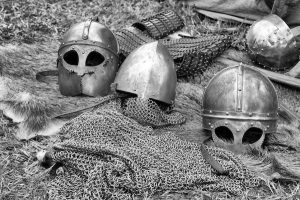Oedipus Rex as a Tragedy
Central Conception
The conception of tragedy which seems central to Oedipus Rex as a tragedy is that of human suffering which arises in a mysterious way, partly out of man’s own actions, and which, when faced manfully, exalts the human sufferers to a level little below that of the gods. The Sophoclean hero is a man of a strong personality, great initiative, and a very strong sense of self- respect. The plot of a typical Sophoclean tragedy is tight and well- integrated. Although the dramatist makes a skillful use of character-contrast in general the tragedies are dominated by a single figure. The chorus is kept in the background in so far as the action of the drama is concerned, but it plays an indispensable part in the evocation of the desired mood and atmosphere. One of the richest features of Sophoclean tragedy is his masterly use of tragic irony.
The Plot
Aristotle singled out the plot of Oedipus Rex for the highest praise and since his time the greatest superlatives have been used for the plot of this tragedy. Coleridge was another critic who valued the plot of Oedipus Rex very highly, for he placed it among the three best-constructed plots in the world. One may go even further and say that no work of literary art can ever hope to equal the mastery which Sophocles has here displayed in the handling of the plot. The most noteworthy feature of the plot of this play is its sheer inevitability – each incident arises quite logically out of the one that has gone before. Aristotle’s test-that no incident should be capable of being deleted or exposed without detriment to the play is here perfectly applicable. Again, reversal and recognition here are an integral part of the plot. The resolution is expected and yet full of unbearable suspense. The plot has also been described as that of a typical detective story, for the main action is the discovery of the murderer of Laius, although that itself is secondary to the eradication of the plague from the city, which can be done only by the expulsion of the murderer.
Establishment Justice
Working out of the plot seems establish justice at the highest level: “The instruments which works, men’s unbridled passions; strikes down murderer by murderer, and punishes crime by crime. But justice appears beyond and above furious impulses, and directs them, spite themselves, to mysterious goal which tends.” recognition that is made Oedipus that man’s insignificance and undependability of happiness. recognition affirmed not only Oedipus himself, but also by chorus.
Universality
Oedipus is superhuman, yet the play possesses universality. Parricide and incest are common actions, delusion of happiness, and the committing unwitting crimes, is universal theme. element of universality enhanced by presence of some of the other characters, notably Jocasta, Creon and chorus. Oedipus also wishes to who is, and this theme of quest identity also has great universal relevance. Oedipus is symbol man, who by good fortune, only to be disappointed all the more when good fortune gives place disaster. It because of universal element in Oedipus’ tragedy that chorus hold him as example before others. In fact, they do so more than once. First, they express this just after Oedipus had made the discovery of his identity and parentage. They exclaim:
All the generations of mortal man add up nothing!
Show me the man whose happiness was anything more than illusion
Followed by disillusion.
Here the instance, here Oedipus, here is reason
Why will call no mortal creature happy.
The second occasion is the end of the play when the chorus sing the exode, the exit ode:
Sons and daughters of Thebes, behold: this was Oedipus.
Was envied by all his fellow-men for his great prosperity,
Greatest of men; he held the key the deepest mysteries;
Was envied by all his fellow-men for his great prosperity;
Behold, what full tide of misfortune swept over his head.
Then learn that mortal man must always look to his ending,
And none can be called happy until that day when he carries
His happiness down to the grave in peace.
The Tragic Hero
According to Aristotle the tragic hero must be a person of noble birth and prosperity whose misfortune results, not from depravity but from some hamartia. The last word has been translated as error of judgement by most critics but interpreted as tragic flaw by some. Oedipus is clearly the intermediate kind of person stipulated by Aristotle, and he is in enjoyment of great happiness and prosperity at the commencement of the story. However, it is difficult to say that his misfortune befalls him because of some flaw in his character, or some error of judgment committed by him There is no doubt that his character has several flaws and that he does commit some errors of judgement, but the question is whether these errors are the cause of his tragedy. Oedipus is no doubt rash, impatient, irritable and passionate. He is also very proud of his intelligence, and believes that he can find the answer to every problem. At more than one place he is also guilty of impious words. His treatment of Creon is far from fair, and he is unnecessarily harsh to Teiresias. Yet, if we take his tragedy to be the basic actions of incest and parricide, then these flaws and errors of Oedipus are quite irrelevant. On the other hand, it is Oedipus who proclaims a severe punishment for the murderer of Laius and also says that he will award the punishment even to himself if he is the guilty person. It is by his words that Teiresias is angered and prophesies that Oedipus will turn out to be the murderer of his father and the husband of his mother. Moreover, Oedipus provokes him further by making fun of his blindness and this leads Teiresias to predict that Oedipus also will become blind and will leave Thebes like a helpless beggar. Although the predictions do not bring about the actions mentioned in them, yet they add to Oedipus’ suffering and humiliation. Or one may say that Oedipus commits the fundamental mistake of thinking himself equal to the gods and of being able to solve every problem. In that case the tragic flaw in Oedipus would become that of arrogance or hubris. His career changes from prosperity to terrible adversity, and he makes the terrible discovery that human knowledge is extremely limited and misleading.
Pity and Terror
According to Aristotle tragedy arouses pity and terror and through these brings about a catharsis or purgation. Although there is a great controversy about the real meaning of catharsis, there is no doubt that the story of the fall of Oedipus is full of great pity and terror. Through these emotions we are made to think deeply about human life. Pity and terror are aroused also by the fact that Oedipus’ efforts to avoid living with his parents, so that he may not commit the crimes of incest and parricide, bring him to his parents, whom he might otherwise have never met. Other instances of tragic irony also produce pity and terror, for example the efforts of Jocasta and the Corinthian Messenger to soothe Oedipus’ fears. These efforts only increase his perturbation by telling him that Laius was killed at a place where three roads meet- exactly the place where Oedipus killed an elderly man who very much resembles Jocasta’s description of Laius, The Corinthian Messenger only succeeds in proving that Polybus was not Oedipus father, so that his death cannot be regarded as the failure of the oracle concerning parricide as thought by both Jocasta and Oedipus. The Theban shepherd who took pity on Oedipus and saved his life is now found to have done the greatest cruelty to him. Pity and terror are aroused also by the fate of Jocasta.
Character and Fate
Greek tragedy is generally believed to be tragedy of fate, in contrast with Shakespearean tragedy which is regarded as tragedy of character. Whether or not this is true of other Greek tragedies, it is inapplicable to Oedipus Rex. At the most we can say that both character and fate play a part in Oedipus Rex as a tragedy. Oedipus is certainly the victim of adverse chances, and in this sense, fate plays a part in his tragedy. Yet it is because of his character as a great discoverer of truth and a man determined to find out what he has decided to discover that Oedipus meets with tragic reversal. In the scene where he is cross-examining the shepherd Jocasta begs him not to carry the investigation further, but he pays no heed to her words. The Theban shepherd also begs that he may not be asked to disclose what he knows, but Oedipus forces him to tell the whole truth. It is this determination of Oedipus to find out the whole truth at any cost which makes him tragic. Another view is that the action of Oedipus Rex moves on two planes at the same time. On one plane Oedipus is a completely free agent while on the other he is a helpless puppet in the hands of the gods. Yet, on the whole the play must be classified as a tragedy of character. As one critic says, what happens to Oedipus is the natural result of his virtues and vices, which also combine with those of other people. It is a tragic chapter from life, complete in itself, except for the original oracle and its repetition. Sophocles is not trying to make us feel that as inexorable destiny or a malignant god is guiding the events.
Moral Wisdom
Traditionally, Oedipus Rex as a tragedy has been regarded as a play which enshrines much moral wisdom, although the wisdom itself has been identified variously. One view is that the play teaches man to restrain himself within the range of his finite qualities and not to vie with the gods. What Oedipus ultimately attains is self-knowledge of a very bitter type, and this knowledge is applicable to all humanity. This knowledge cures him of his earlier conceit that he is all-knowing. The play makes it evident that for Oedipus, if for no one else, self-knowledge is an appalling and humbling experience. There is at first sight no universal meaning discernible here: Oedipus has a singular past to learn about, and there will always be readers to say that this has nothing to do with them. But it would have reminded any Greek spectator of the maxim engraved at Delphi, which was attributed to more than one of the Seven Wise Men and had become a part of the popular wisdom: Know Thyself. There was, moreover, a commonly accepted way of understanding the phrase, viz. ‘Know your limitations, especially in relations to the gods, and stay within them.’ Self-knowledge is therefore understandably associated with sophrosyne, a word usually best translated as modesty or self-restraint.
#Oedipus Rex as a tragedy #Oedipus Rex as a tragedy #Oedipus Rex as a tragedy #Oedipus Rex as a tragedy #Oedipus Rex as a tragedy #Oedipus Rex as a tragedy #Oedipus Rex as a tragedy #Oedipus Rex as a tragedy #Oedipus Rex as a tragedy #Oedipus Rex as a tragedy #Oedipus Rex as a tragedy #Oedipus Rex as a tragedy #Oedipus Rex as a tragedy #Oedipus Rex as a tragedy #Oedipus Rex as a tragedy #Oedipus Rex as a tragedy #Oedipus Rex as a tragedy
Read More
Visit Us on our Facebook Page:





